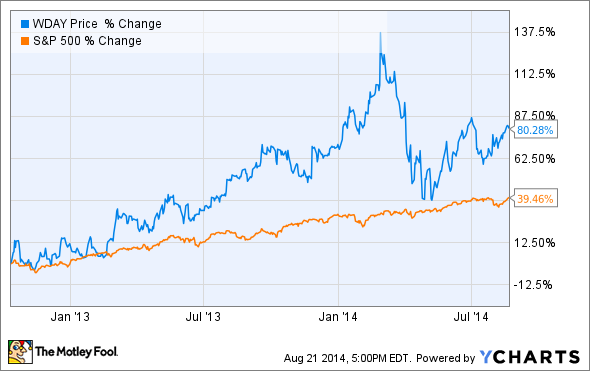Workday (WDAY 2.02%) has been a tech stock to watch since its explosive IPO in 2012, and shares currently trade approximately 80% higher than their initial pricing. That said, its valuation has seen dramatic swings over the last year, with the share price reaching an all-time high of $116.49 at the end of February, then falling approximately 24% over subsequent months to reach current levels.
Workday managed to grow revenue by 71% to $468.9 million in its last fiscal year, and expects revenue in the current annual term to climb to at least $710 million. The projected increase in business comes as the company expands the reach of its cloud-based enterprise resource planning software and aims to better address the education and government segment. Workday's streamlined human capital and financial management solutions might appear to put the company in good position to acquire new clients as demand for these systems grows, but there are notable risks that investors should consider before taking a position in the company. The following three problem areas could cause Workday's valuation to fall.
Competition in cloud-based ERP solutions will become increasingly fierce
While Workday has built a reputation for well-designed software suites and high levels of customer satisfaction, there's no denying that the young company is looking at increased competition with cloud giants going forward. Workday's most recent fiscal year report characterizes the human capital management sector as fiercely contested and lists Oracle and SAP AG as its primary competitors in the space. Workday has a market cap of approximately $16 billion, while Oracle stands at approximately $185 billion and SAP AG is valued at approximately $96 billion, so the ERP newcomer is working at a considerable disadvantage as the established companies increasingly focus on the cloud.
In order for Workday to meet its growth targets the company has been ramping up research and development and marketing expenditures, but these efforts could prove insufficient if bigger competitors utilize their financial and structural advantages.
Both Oracle and SAP AG possess larger customer bases, better brand recognition, and superior advertising and development resources. Workday's big competitors could lower their prices in order to secure a larger share of the cloud ERP software market, thereby limiting the smaller company's ability to meet its growth targets. Large competitors like Oracle and SAP AG could also absorb Workday's smaller competitors, or form strategic partnerships like the arrangement made between Oracle and Salesforce.com (CRM 0.55%). Any of these possibilities have the potential to destabilize the company's growth and push its share price downward.
Workday's offerings may fall flat in international markets
Workday's current earnings are mostly derived from contracts with its U.S. subscriber base, however the company's growth plans remain dependent on successful expansion into foreign markets. Reaching its goals in international territories requires significant product development and advertising resources so as to adequately shape and sell its offerings to a given market. Expanding its operations to a worldwide scale has obvious benefits for the company, however, a multitude of variables could render its efforts in foreign markets insufficient.
Overseas suppliers of competing human capital and financial management solutions enjoy advantages in tailoring software solutions to the needs of their territory. Foreign companies and government institutions seeking ERP solutions may also opt to deal with their local companies for pricing or political reasons.
Further complicating Workday's ability to diversify its geographical revenue sources, rival services may be able to replicate or absorb defining features of Workday's ERP platform, with some competitors potentially achieving this end through means that would be illegal in the United States. Additionally, the possibility for declines in national and global corporate spending, slowed growth or decline in use of cloud solutions, and changes in governmental structures and regulatory policies create opportunities for Workday's growth plans to falter, and also highlight the difficulties inherent to modeling expansion into untapped foreign markets.
Failure to meet growth targets could be disastrous for Workday's valuation
Workday has not turned a profit since its founding in 2005, and its current valuation is built around lofty growth projections. The cloud-based ERP market is forecasted to expand significantly as more businesses transition from on-premise resource management to SaaS solutions, and Workday is hypothetically positioned to benefit.
That said, shares of the company are priced for growth that significantly outstrips expectations for its comparably sized competitors. Workday currently has a trailing price-to-sales ratio of 28.5, while Salesforce comes in at 7.7 and Netsuite has a ratio of 13.3.
If confidence in the cloud-based ERP sector or Workday's individual offerings should falter, for any reason, investors could quickly lose faith in the company's growth trajectory, likely triggering significant downward adjustment in its share price. If Workday is forced to restructure ahead of schedule so as to generate profits, or at least reduce losses, its ability to scale its business as planned could be compromised.
Foolish final thoughts
Given the challenges facing Workday and the company's highly growth-dependent pricing, the case can be made that shares are currently overvalued. That doesn't mean these risks, viewed individually or in conjunction, offer clear-cut evidence that shares will fall, but they are important elements to watch going forward.





